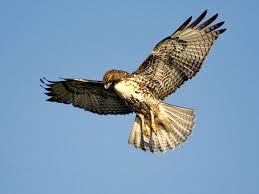hawk
英 [hɔːk]
美 [hɑːk]
- vt. 兜售,沿街叫卖;捕捉;咳出
- vi. 清嗓;咳嗽;像鹰一般地袭击
- n. 鹰;鹰派成员;掠夺他人的人
- n. (Hawk)人名;(英)霍克;(西)奥克
使用频率:

记忆方法
将“hawk”与“how”发音相近联系,想象一只雄鹰(hawk)在空中翱翔(how),这个画面可以帮助记忆单词“hawk”,意为“鹰”或用作动词表示“挥动,飞翔”。
以上内容由AI生成, 仅供参考和借鉴
中文词源
hawk 鹰,隼
来自中古英语havek,来自PIE*kap,抓住,词源同have,heave,capable.后用于指猛禽鹰或隼。
英语词源
- hawk
-
hawk: English has three current words hawk. The oldest, denoting the bird of prey [OE], comes from a prehistoric West and North Germanic *khabukaz, which also produced German habicht, Dutch havik, Swedish hök, and Danish hög. Hawk ‘peddle’ [16] is a back-formation from hawker. This was probably borrowed from Low German höker, a derivative ultimately of Middle Low German hōken ‘peddle’, which may well have been formed from the same base as produced English huckster. Hawk ‘clear the throat’ [16] probably originated as an imitation of the noise it denotes.
=> huckster - hawk (n.)
- c. 1300, hauk, earlier havek (c. 1200), from Old English hafoc (West Saxon), heafuc (Mercian), heafoc, "hawk," from Proto-Germanic *habukaz (cognates: Old Norse haukr, Old Saxon habuc, Middle Dutch havik, Old High German habuh, German Habicht "hawk"), from a root meaning "to seize," from PIE *kap- "to grasp" (cognates: Russian kobec "a kind of falcon;" see capable). Transferred sense of "militarist" attested from 1956, probably based on its opposite, dove.
- hawk (v.1)
- "to sell in the open, peddle," late 15c., back-formation from hawker "itinerant vendor" (c. 1400), agent noun from Middle Low German höken "to peddle, carry on the back, squat," from Proto-Germanic *huk-. Related: Hawked; hawking. Despite the etymological connection with stooping under a burden on one's back, a hawker is technically distinguished from a peddler by use of a horse and cart or a van.
- hawk (v.2)
- "to hunt with a hawk," mid-14c., from hawk (n.).
- hawk (v.3)
- "to clear one's throat," 1580s, imitative.
权威例句
- 1. The hawk swooped and soared away carrying something.
- 那只鹰向下猛冲,抓住东西后又展翅高飞了。
- 2. A hawk hovered over the hill.
- 一只鹰在小山的上空翱翔。
- 3. The hawk poised in mid-air ready to swoop.
- 老鹰在半空中盘旋,准备俯冲。
- 4. The hawk swooped down on the rabbit and killed it.
- 鹰猛地朝兔子扑下来,并把它杀死.
- 5. A hawk hovered in the blue sky.
- 一只老鹰在蓝色的天空中翱翔.